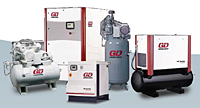
Energy Machinery, Inc.
10 Reservoir Park Drive
Rockland, MA 02370
Toll Free: 1-800-643-4330
10 Reservoir Park Drive
Rockland, MA 02370
Toll Free: 1-800-643-4330


Item # |
Type |
Motor Power |
Pump Comp Model |
Length |
Sound Level |
175 PSI Rating |
|---|---|---|---|---|---|---|
| BER-5 | N/A Base Mounted Units | N/A 5 hp | N/A RP15B | N/A 40 1/2 in | N/A 67 dBA | N/A 734 rpm |
| BER-7F | N/A Base Mounted Units | N/A 7 1/2 hp | N/A RP15B | N/A 40 1/2 in | N/A 68 dBA | N/A 990 rpm |
| BER-10 | N/A Base Mounted Units | N/A 10 hp | N/A RP30D | N/A 50 1/2 in | N/A 66 dBA | N/A 740 rpm |
| BER-15F | N/A Base Mounted Units | N/A 15 hp | N/A RP30D | N/A 50 1/2 in | N/A 70 dBA | N/A 1045 rpm |
| HER5-8 | N/A Horizontal Tank Mounted Units | N/A 5 hp | N/A RP15B | N/A 67 in | N/A 67 dBA | N/A 734 rpm |
| HER7F-8 | N/A Horizontal Tank Mounted Units | N/A 7 1/2 hp | N/A RP15B | N/A 67 in | N/A 68 dBA | N/A 990 rpm |
| HER10-12 | N/A Horizontal Tank Mounted Units | N/A 10 hp | N/A RP30D | N/A 73 in | N/A 66 dBA | N/A 740 rpm |
| HER15F-12 | N/A Horizontal Tank Mounted Units | N/A 15 hp | N/A RP30D | N/A 73 in | N/A 70 dBA | N/A 1045 rpm |